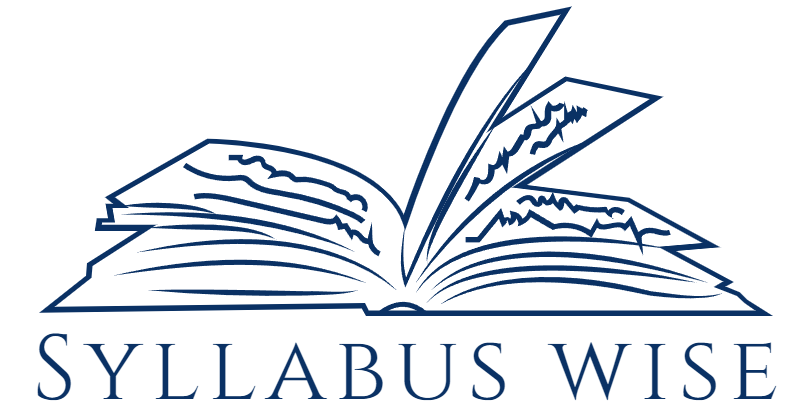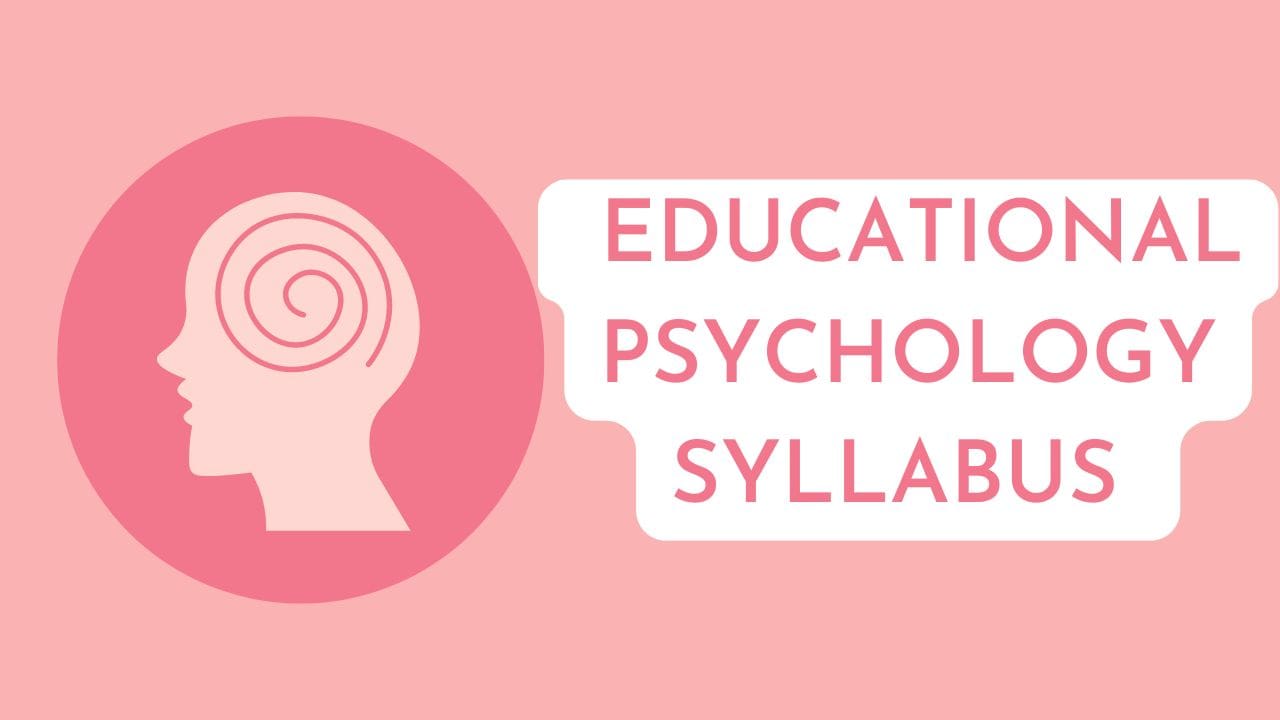Educational Psychology Syllabus
Educational psychology is the study of the process of humans learning and acquiring of knowledge, particularly in educational settings like classrooms. Educational psychology includes emotional, social, and cognitive learning processes. Educational psychology is the branch of psychology and Education that concerned with the scientific study of human learning that includes study of learning processes, from both the cognitive and behavioral perspective that helps to understand individual differences.
Table of Contents
Educational Psychology Syllabus can vary from one university or institution to another university or institutions, but it generally covers some kind of topics related to the psychological principles, theories, and actions that apply to education and classroom learning processes. Here is the detailed Educational Psychology syllabus that covers every important topics related to the subject of Educational Psychology :
Educational Psychology Syllabus covers different papers like-
| Educational Psychology | 1. Introduction to Educational Psychology 2. Human Growth and Development 3. Learning Theories 4. Motivation in Learning 5. Intelligence and Creativity 6. Memory and Cognition 7. Classroom Management and Discipline 8. Assessment and Evaluation 9. Special Education and Inclusive Education 10. Psychological Issues in Education 11. Research Methods in Educational Psychology 12. Current Trends and Issues in Educational Psychology |
Educational Psychology Syllabus Outline
| Paper | -Principles of assessment and evaluation -Types of assessments: formative, summative, diagnostic, norm-referenced, criterion-referenced -Constructing and using tests and quizzes -Interpreting assessment data |
| Introduction to Educational Psychology | -Definition, nature, and scope of Educational Psychology -Historical development and contributions to education -Relationship between psychology and education -Role of Educational Psychologists |
| Human Growth and Development | -Stages of human development: physical, cognitive, emotional, and social -Theories of development: Piaget, Vygotsky, Erikson, Kohlberg -Individual differences in development |
| Learning Theories | -Behaviourism: Pavlov, Skinner, and Watson -Cognitive theories: Piaget, Vygotsky, Bruner -Constructivism -Social learning theory: Bandura -Information processing theory |
| Motivation in Learning | -Theories of motivation: Maslow, Herzberg, McClelland, Weiner -Intrinsic and extrinsic motivation -Classroom application of motivational theories -Strategies for enhancing student motivation |
| Intelligence and Creativity | -Concepts of intelligence and creativity -Theories of intelligence: Spearman, Gardner, Sternberg -Measurement of intelligence: IQ tests and other assessments -Creativity: nature, processes, and fostering creativity in the classroom |
| Memory and Cognition | -Processes of memory: encoding, storage, retrieval -Types of memory: sensory, short-term, long-term -Cognitive processes: perception, attention, thinking, problem-solving -Improving memory and cognitive skills in students |
| Classroom Management and Discipline | -Principles of effective classroom management -Strategies for maintaining discipline -Behavior modification techniques -Creating a positive learning environment |
| Assessment and Evaluation | -Principles of assessment and evaluation -Types of assessments: formative, summative, diagnostic, norm- referenced, criterion-referenced -Constructing and using tests and quizzes -Interpreting assessment data |
| Special Education and Inclusive Education | -Understanding special needs students -Approaches to inclusive education -Techniques and strategies for supporting diverse learners -Legal and ethical considerations in special education |
| Psychological Issues in Education | -Understanding special needs students -Approaches to inclusive education -Techniques and strategies for supporting diverse learners -Legal and ethical considerations in special education |
| Research Methods in Educational Psychology | -Stress and anxiety in students -Impact of mental health on learning -Addressing bullying and peer pressure -Promoting emotional and social well-being |
| Current Trends and Issues in Educational Psychology | -Technology in education and its psychological impact -Cross-cultural psychology in education -Lifelong learning and adult education -Educational policies and their psychological implications |
If you are interested in the Educational Psychology Syllabus then you may be want to know the detailed OSSSC TGT Syllabus
This educational psychology syllabus covers all the topic related to the subject. Different universities and educational institutions may include these topics or include some additional topics or modify the existing ones based on their curriculum requirements.
Here I have attached the Educational Psychology Syllabus Harvard pdf:
Here I have attached an Educational Psychology Pdf that is helpful for medical educational psychology students.
Importance of studying educational psychology
In any given classroom, pupils come from different environments, have different interests, and understand at different rates, in different ways. Pupils are not always open to their teachers on issues affecting their learning, so there is a need for the teacher to know the individual strengths and weaknesses of his or her pupils without verbally communication with them.
The key goal of going to school is to learn. Hence, educational psychology is a tool used by teachers to promote the learning of different pupils in the same class since the key goal of going to school is to learn. The writer is going to define psychology, educational psychology, and classroom teaching, explain the relevance of aspects of human development and lastly make a conclusion.
ROLE AND APPLICATION OF PSYCHOLOGY IN EDUCATION
Educational Psychology in Education
The study of teaching and learning is a relatively new field, carried out by a young science from the social areas of the branch of psychology, which relies on psychological and didactic methods to support the academic development of students. Based on this premise, the objective of analyzing the contributions of psych pedagogy in education was established.
Bibliographical research from reliable and current sources was applied, from a qualitative approach to give value to the information consulted and a deductive and inductive style in the text structure for its understanding. The results obtained allowed for a better understanding of study science and its contributions in the educational sector. It was concluded with a positive, realistic and enthusiastic approach to the research topic.
List of Important Educational Psychology Books :
Educational Psychology- by Anita Woolfolk
Essentials of Education Psychology -by S. K. Mangal
Advanced Educational Psychology- S.K. Mangal
What is the concept of educational psychology?
Educational psychology is a subject of study and branch discipline of psychology that is focusing on understanding how people learn in an educational setting and the various factors that influence learning of an Individual.
Who is known as the Father of educational psychology?
Edward Lee Thorndike
What is the main goal of educational psychology?
The primary goal of educational psychology is to study how people learn.
What is the relationship between education and psychology?
Individuals need education to modify their behavior whereas psychology is the study of Human behavior.
What are the functions of education psychology?
Understanding Learning Processes
Assessment and Evaluation
Curriculum Development
Intervention Strategies

